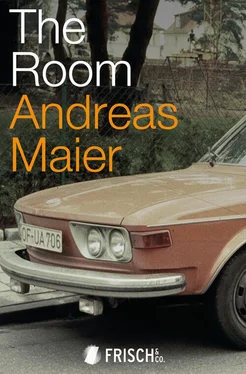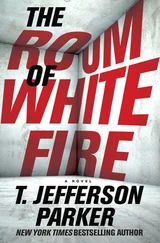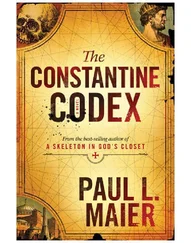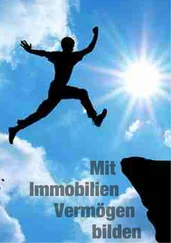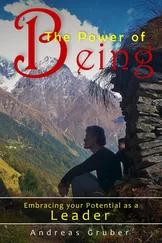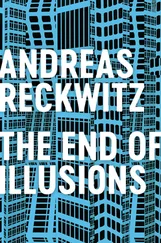Things must have been different with his father. After coming back from the Rhineland, J had to help out in the business, under his father’s supervision, a man who allegedly viewed him with disapproval. After completing his tasks, J would set off to walk the three kilometres home to neighbouring Bad Nauheim, taking the same path I have often taken during the last ten years in remembrance of him (or as his revenant), past the Kühlen Grund and then through the floodplain along the Usa, our river, right along to the allotment gardens in Nauheim. If someone wanted to take this route today, they wouldn’t be able to, because the main artery of the bypass runs there now. My uncle used to walk there (back when this there still existed) to get home, the home that my grandfather was driving towards in his car at the exact same time. I don’t know what model car he had, for it was long before my day. Back then, after the Rhineland, my uncle got taller and taller, seventeen or eighteen years old by then, but his legs were still so thin, as if they could barely hold him up and were about to snap. His ears jutted out from his head, as if they wanted to escape, in the same way his eyes did. And so he would walk his daily kilometres through the Wetterau countryside, across the meadows and the fields that the farmers had sewn, gradually becoming accustomed to it; he must have gotten his enthusiasm for nature from somewhere, after all, or had he simply been born with it? Perhaps it was his father’s alleged (I don’t know for sure, after all, I just heard about it) hate for him that led him to the Usa, the Wetterau and the forest, and from there perhaps to Heino and German music and Luis Trenker, mountain rescue, the Wehrmacht, heroic pilots and heroic generals and the great old days in general (which no one spoke of anymore by that point, something which J was only ever able to accept without really understanding). And because there were times in his younger days when he was excluded, presumably he found peace out there from many things, and ultimately from himself. In this respect, his father had even more of an influence on him than his mother, for his father gave him a world, the daily three kilometres, and with it perhaps the whole of the Wetterau right up to Forsthaus Winterstein, which J would escape to, just as I would later escape to the cemetery whenever J came to our house in Friedberg and I could no longer breathe, and as a result I spent every weekend learning the inscriptions on the gravestones off by heart. J’s mother, on the other hand, was always just the home and the law. And yet if there had only ever been her, he wouldn’t have had anything to flee from. Three kilometres, my uncle alone with himself every day, at seventeen, eighteen years of age, and maybe he saw his first kingfisher there, maybe it was where everything started for him, and in the inns he was allowed to drink beer, which he probably wasn’t allowed to do at the family business, on the crane, in the halls, in the driver’s cabins, and so in the inns he could still somehow be one of the Boll stonemasons. During these three kilometres (there was an inn along the route, Zum Kühlen Grund), he got to know the flowers and animals as well as the beer and the inn, perhaps as practically one and the same from the very beginning (he always preferred going to inns that you needed to go through a forest to reach). Later on, hunting became the sum of them both. A hunter goes into the forest, then to the forest inn. Perhaps the best possible combination for my uncle. Perhaps the best things in the world, hunting and the forest inn.
J still has the whole afternoon in front of him, not to mention the evening. He’s just reached Bad Vilbel. The Wetterau is already gleaming in the distance, perhaps it’s a sunny day. The Nidda to the left, people out for a stroll, none of them have anything to do and they are already walking along the riverbank by three o’clock in the afternoon. Sometimes, J sees a brown hare. When he does, he almost jumps out of his seat, wishing he had his binoculars with him, but they’re too big to bring along. Old-fashioned binoculars, like the ones made for hunters or the military, worn-out and already stinking of my uncle (they’re in the cupboard in Uhlandstrasse today, and even now they still stink of him). You can see kingfishers there too. Even though the train is a good fifteen metres away from the Nidda, it’s possible to spot a kingfisher flying along the river bank without any trouble. Perhaps my uncle is standing by the window and waiting for the brown hare or kingfisher to appear. Perhaps it’s the year of the moon landing, when he had recently returned to the Wetterau, his home. I was two years old at the time. Germany in 1969, a country before the traffic system collapsed for the first time. A country without bypass roads. Every now and again, a horse and cart still winds its way down the country road. A few years later, there will only be cars.
It wouldn’t be long before they had little else in mind than driving cars, even on the moon. The seventh man on the moon was a motorist. First they just wanted to get to the moon, full-stop, but almost as soon as they were there, they wanted to drive an automobile too, and it didn’t take them long before they brought one with them. If they really wanted to bring something from Earth, they could have brought a cross, or a small church, collapsible like their automobile or lunar rover, they could have brought a Madonna figurine or relic, or at least the branch of some tree. But instead they brought cameras, golf clubs and cars. That’s what they were like.
People never know what to do when they arrive somewhere, whether that somewhere is at home or on the moon. It’s always the same with humans; whenever they go to a place, they need to bring something with them, so they can cope. There were only twelve of them up there, remember, and yet they still couldn’t cope. By the third or fourth moon landing they needed a car, whereas the first time they had been happy just to step outside at all. In the beginning they were still on foot, like my great-grandmother Else in Wetterau, who walked from Friedberg to Nieder-Mörlen day after day, seven kilometres there and seven kilometres back. In the beginning it was a step for mankind, and just three years later (which was already the end of moon exploration, they didn’t go back after that) it was a thirty-five kilometre sightseeing tour with a golf programme attached. They had to— wanted to — play golf even up there (or down there, depending on how you look at it). These are the pictures that mankind marveled at: two white figures in the bleakest wasteland you could imagine. So much so that it could even have been a film studio somewhere (one without enough sand to build a proper mountain). Two lonely human beings in the middle of Somewhere, reliant upon a makeshift device, a kind of stopgap in order to bridge the great loneliness until Being-Back-At-Home (although what was home to them?). All the Apollo rockets were discarded straight afterwards, that was part of it. They launch, then become waste. That’s how human beings think, that’s the way they build things. They feel bad about the birds in the Gospels because they don’t live like the birds in the Gospels, and perhaps this guilt leads them to emulate the birds, desiring flight, and in doing so they alienate themselves from the birds in the Gospels even further; that’s how everything always goes with us, in circles and downhill. And yet every day has its own burden, its own struggle. Downwards, that’s the direction we always go, even when we’re going up to the moon. Human beings in the most desolate of all wastelands, and us worshipping it on TV. If my uncle had had a space suit on, if he’d been on the moon, for him it might even have been superior to a successful mission with his tank division in the Russian campaign. I say might , because I’m not totally sure. My uncle sat in front of the TV for every moon landing, and so did I. I had just turned five and still remember it now; that although the whole moon exploration thing had only just started, they were already saying it was over. For me, the last so-called mission (a word which, as a child, I was more familiar with in a religious context), the launch probably my fourth already, was a routine matter. Meanwhile, my brother built model versions of the lunar rovers and the Apollo rockets, all of which could be assembled and disassembled in stages and had detachable land buggies, towering a metre high in his bedroom. The launch on TV, then the reports about the flight’s status, and everyone was bored by the third or fourth landing, and no one wanted to watch anymore, no one understood why it was still being reported on nonstop. I was only five, and even I was bored — although, of course, only because everyone else was bored. And it was the same on the moon too. So they had to get a lunar buggy up there quick, in order to be able to cope, and on Earth too they soon needed something completely different to the moon and the people on it. The moon landing business didn’t last long. A decade spent striving for it, just three years actually doing it, and then everyone was bored already, and even my uncle was back to finding the old Luis Trenker mountain rescue films more exciting than the moon landing transmissions and their expert panel discussions on ARD and ZDF. Even he was switching over. Even the 1960s crime series Stahlnetz, summa summarum , held out longer than the Apollo sequels. The moon, interestingly, wasn’t presented in a romantic way in any of the transmissions, if I remember correctly (despite — as people always said — all the lovers beneath it), because the Earth was suddenly being cast romantically instead, because people were seeing it for the first time. They saw the Earth for the first time, and everyone thought it would change everything, that it would change them, the onlookers, and that it would change the world (because they were looking at it), but of course it didn’t change a single thing. After all, it was only photography. It was only media. In 1969, people (we) saw the Earth from a distance for the first time, and everyone was astounded and said it was progress and suddenly thought the world was beautiful, much in the same way as they thought Marilyn Monroe was beautiful. The Earth was suddenly telegenic, it could suddenly be photographed; the magazines wanted it, a motif at last, the Earth as a motif, and so blue, and so white, and so beautiful. My mentally-impaired-at-birth uncle J wasn’t like that. He saw the pictures of the blue Earth as progress and nothing more, not confusing it with the German forests and suchlike, more interested in the model of camera that had been used to photograph the Earth from space than he was in the Earth itself. For others, it suddenly possessed the beauty of a swan. But J didn’t get his appreciation for nature from the TV, even though he did watch nature programmes. For my uncle, the Apollo rockets were a kind of Super VW Variant, and the idea that all of this could have had anything to do with birdsong and fields and meadows (as it seemed later for the disciples of the Apollo-created concept of the blue planet) hadn’t occurred to him, nor would he have understood it if it had. There was no TV in Forsthaus Winterstein at the time of the moon landings. The stags and the hares and the foxes didn’t have a clue about any of it anyway.
Читать дальше
